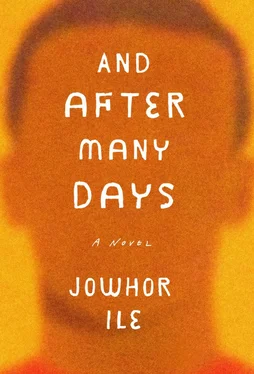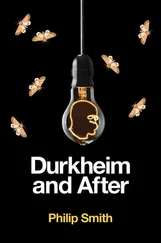For the whole of that afternoon, through social studies lesson and composition exercise, Ajie planned his defense. He would beg. He would plead momentary anger; it wasn’t really a fight, he didn’t know when it happened, he lost his temper, the slap slipped out of him, and there was no way to take it back. Give me one more chance, please, Bendic .
Years later, in boarding school, when Ajie fought again, it was with proper blows, kicks, and tumbles in a rough circle of cheering boys in shorts and checked gingham shirts. He couldn’t recall all the details of this fight. He remembered the boy, whose father, it turned out, died later that term in a car crash on the Lagos-Ibadan Expressway. He could not remember what led to the fight.
—
After Bendic walked in on Ajie and Bibi’s skirmish and outlawed fighting in the house, he dropped his briefcase on the dining table and walked into his room. No one spoke or moved for a while, and the house settled into a deep silence and near-evening shadows. The power outage had stretched for hours. Their parents’ bedroom door was left wide open for air. Bendic was taking a nap, lying almost spread-eagled on the king-size bed. The curtains were hiked up and tucked in severely on the rails, the French windows pushed out so that the room was filled with the waning afternoon light. Paul walked along the passage on the balls of his feet. He turned the doorknob to his and Ajie’s room, slowly, to suppress the click. Ajie followed in slow motion, stepping high on his toes. Paul pulled out the side drawer by his bed and got out a comic book he had borrowed from Fola, slim and glossy, with speech balloons floating about the front page. He rolled up the book and put it in his pocket, though most of it stuck out on the side of his T-shirt.
“Let’s go.”
“I’m coming,” Ajie said, changing quickly into a fresh T-shirt.
“What’s Bibi doing?”
“I don’t know.” He didn’t care.
Fola’s father was not back from work when they got to his house. “Let’s go to the back,” Fola said after he met them near the gate, “my mother is with a visitor.”
Paul handed him the comic book.
“I have others. I went to Leventis with my father on Saturday. I got four more,” Fola said.
“Ask me a capital,” Ajie interjected as they walked past the septic tanks. After the afternoon’s ordeal with Bendic, he was determined to lighten his own mood.
“State or country?” Paul asked.
Fola’s house help must have spent the morning washing bedsheets and towels. They ducked their heads under the line sagging with clothes long dried. Two blue pillowcases and something with bold stripes had fallen to the ground, crisp.
“States are easy,” Ajie said. “I have the highest score in my class in general knowledge.”
“If you want to do something difficult,” Fola said, “try the thirteen times table.”
“We do fourteen times tables first thing every morning now,” Paul said. “Our new teacher is Ghanaian. He is very serious. If he catches you hesitating or chewing your lip, he”ll single you out to recite it in front of the class. Olumide got six strokes today for getting three answers wrong.”
“Ask me any country’s capital and I will tell you,” Ajie said, bringing them back to where they started.
“Namibia.”
“Windhoek,” Ajie answered.
“I just gave you an easy one. Wait, let me think.” Fola paused. “Mmm…El Salvador.”
“San Salvador.”
“Suriname?” Paul asked this time.
“What?” Fola made a sound between mockery and surprise. “Is that even a country? Okay, answer that.”
Ajie stood still, eyes distant, moving his lips a little as if muttering to himself.
“You don’t know it!” Fola chirped.
“Paramaribo,” Ajie exclaimed, and then walked on.
“Did he get it?” Fola asked, looking at Paul.
Paul nodded. “Good one.”
“Another?”
“Iceland,” Fola said, distracted.
“Reykjavík.” The answer came before Fola finished.
“Is that how to pronounce it?”
“Rei-ka-vik. And I can spell it if you want.”
“Let’s do something else, please,” Fola said, unable to suppress his boredom.
Behind Fola’s house was a sloping field cut to a low brush. A small house that was formerly the servants’ quarters stood at the corner by the fence. They sat by the barbed wire fence that separated the house from the mangrove creek where flying insects appeared all at once. The boys flapped their hands in the air and slapped some against their bodies.
Paul stood up and walked toward the mango tree by the fence. He jumped up, caught a branch, and clambered up the tree.
“Our gateman killed a snake from that tree last week,” Fola said apprehensively. “He was shaking it for ripe mangoes and a big snake fell down.”
“Really!” Paul said with wide eyes, looking down at Fola from the tree.
“I’m serious,” Fola said, sounding ominous, as though a slither of snakes might just descend upon them at any moment.
“What color was the snake?” Ajie asked.
“What?”
“The snake your gateman killed, what color was it?”
“Green.”
Paul had jumped down from the tree, rubbing tree bark from his arms. “How long was the snake?” he asked.
“As long as this.” Fola stretched out his right hand, and then with his other hand, he picked a region near the center of his chest. “Or even longer. Our gateman buried it right there.” He pointed at a spot near the fence.
“It’s probably a tree snake,” Paul said after a while.
Ajie knew then that Paul would be going up the tree anyway.
“You know tree snakes don’t bite,” Paul said, looking at Fola. “You said it was green, right?” He was engaging his expertise on snakes, an expertise gained solely by looking through Ma’s encyclopedias and watching the occasional wildlife documentary on TV.
“Hmm, I don’t know for you-o, Paul,” Fola said.
Ajie wanted to note that its color and placement in a tree weren’t enough facts to determine that it was the venomless tree snake. He knew Paul wanted to climb the tree, so he stayed silent. His mind was changing by the second: Maybe Paul was right and it was just an ordinary tree snake.
Paul was climbing up the tree. Ajie watched as he moved from branch to branch. Soon he was at the very top. He stood on a branch and began to reach out for the fruits. He didn’t ask either Ajie or Fola to join. Just being up there seemed a strong enough invitation.
He sank his teeth into a mango. “Should I throw some down for you?”
“I’m coming up,” Fola said.
“Me, too.”
Ajie stood up and began pulling himself up the trunk of the tree, upward, upward, inch by inch, till he got to the first spread of branches and caught hold of one, then hauled his body up the tree. “If you are afraid, you will fall,” Paul said, looking down at Ajie. “You are not heavy enough to break a branch, just hold tight.”
Ajie could see Paul’s gray T-shirt up there with the green leaves and blue sky. Fola was right beneath him now, on the same branch, his breath heavy and labored. A stiff wind blew through and rustled the leaves, and Ajie’s heart skipped a beat, but he laughed out, “Wow!” On the treetop, they perched on the youngest branches like three little birds, looking down on all the rooftops from here to the expressway, watching cars come and go but without hearing the engines.
“If we climb down to the branch below,” Paul said, “we can jump to the other side of the fence.”
Another gust, stronger than the first, blew and whispered past Ajie’s ears, and he imagined being caught on the barbed wire while trying to jump. He held on tight to the branch beside him and looked across the desiccating swamp, catching a whiff of the muddy stink, imagining his exhilaration at having jumped. It was the present notion of actually doing it that knotted his lungs and made breathing difficult.
Читать дальше












